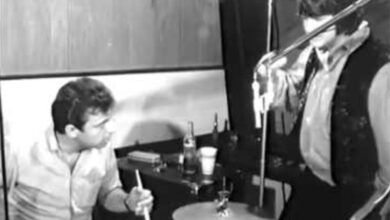This Performance Confirms Young People Recognize Patsy’s Divine Talent, Unlike Most of Today’s Artists
Patsy Cline, born Virginia Patterson Hensley in 1932 in Winchester, Virginia, emerged as one of the most influential voices in country music despite her tragically short life. Raised in a musical family, Cline began performing in local clubs and on radio shows as a teenager, showcasing a voice that blended a rich, velvety tone with a distinctive emotional depth. Her early recordings in the 1950s, including “Walkin’ After Midnight,” hinted at her potential to become a country music icon.
It was in the early 1960s, however, that Cline solidified her legacy with “Crazy,” a song that not only became synonymous with her but also cemented her status as a masterful interpreter of heartfelt ballads. Written by Willie Nelson, who was then a struggling songwriter, “Crazy” initially faced resistance from Cline due to Nelson’s unconventional phrasing in the demo. However, upon hearing the song’s potential and with encouragement from her producer Owen Bradley, Cline reinterpreted it in her own elegant style.
The recording of “Crazy” at Bradley’s Quonset Hut Studio was a poignant moment in Cline’s career. Despite recovering from a near-fatal car accident that left her with lingering physical pain, she channeled her personal turmoil into the song’s performance, capturing its essence of heartache and longing. Backed by a stellar lineup of musicians including pianist Floyd Cramer and guitarist Harold Bradley, Cline’s vocal delivery on “Crazy” was both tender and powerful, marking a defining moment in country music history.
Upon its release in October 1961, “Crazy” resonated deeply with audiences, climbing to number two on the Billboard Hot Country Singles chart and making a significant impact on the pop charts as well, peaking at number nine. The song’s crossover appeal underscored Cline’s ability to transcend genre boundaries, reaching listeners who were moved by her emotive storytelling and the sincerity of her voice.
“Crazy” became more than just a hit single; it became a cultural phenomenon. Its enduring popularity led to countless cover versions by artists from diverse musical backgrounds, each interpreting the song’s melancholic beauty in their own way. Nelson himself praised Cline’s rendition, acknowledging her ability to capture the delicate emotions woven into his lyrics.
Tragically, Patsy Cline’s life was cut short at the age of 30 in a plane crash in 1963, along with fellow country stars Cowboy Copas and Hawkshaw Hawkins. Her untimely death shocked the music world and left an irreplaceable void in country music. Despite her brief career, Cline’s impact endures through her recordings, which continue to be cherished by fans old and new.
Beyond “Crazy,” Cline’s catalog includes other notable songs such as “I Fall to Pieces” and “She’s Got You,” each showcasing her ability to interpret songs with depth and authenticity. Her influence on subsequent generations of country artists is profound, with her vocal style often cited as a benchmark of emotional expression in the genre.
In recognition of her contributions to music, Patsy Cline was posthumously inducted into the Country Music Hall of Fame in 1973. Her legacy remains vibrant through tributes, documentaries, and the enduring popularity of her recordings, which resonate with listeners drawn to the timeless themes of love, loss, and longing that she so beautifully captured in songs like “Crazy.” For those seeking to explore more about Patsy Cline’s life and music, a wealth of resources including biographies, documentaries, and archival recordings offer a deeper understanding of her enduring impact on American music.





